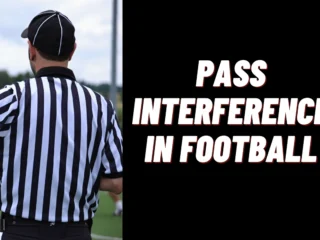Pass interference can completely change the outcomes of any football match noprice 110010. It’s a frequent penalty that is often at the high school, college, and professional level football games. What is pass interference and what is the significance of this penalty?
Pass interference occurs the act of preventing the offensive player from catching the football. The ruling states that an offensive player can’t be touched by a defensive player when the ball is up in the air. If the defensive player does, it will be deemed pass interference.
This article will go over everything you require about pass interference.
Interference with defensive passes
Pass interferences that are defensive could drastically alter the flow of any football game. This rule was introduced at the time forward passes were permitted.
The pass interference rule was implemented to give players who are trying to catch the ball the right to catch it with no player interfering.
There are many reasons the referee could issue an flag to stop a pass.
The most commonly used type of pass interference happens when two players are both trying to catch the ball however the player on defense is over insecure. It is often the case that the official throwing the penalty flag.
The offensive player has to be allowed to receive the ball.
However the defensive player enjoys the same rights in relation to the football as offensive players. If the defensive player is gazing back at the football and is in a position that they are able to catch it, they might try to catch it.
A penalty flag is generally given when a defensive team fails to make an effort to position themselves to kick the ball into the air. They are too close to the wide receiver and result in the flag being thrown.
Penalty For Pass Interference
If the football official decides that the defensive player been in too close contact with the wide receiver they will wave a flag instead of trying to catch the football.
Based on the level of play at, the penalty flag will be different. These are the different penalties for every football league.
- High School 15 Yard Penalty To The Line Of Scrimmage
- College: 15 Yard Penalty From the Line of Scrimmage & Automatic First Down
- Professional: Automatic First Down & The Ball Is Located Where The Penalty Was Committed
As you can see, pass interference is punished at the professional level with more severity than it is at college and high school levels.
High school pass interference doesn’t necessarily mean that it’s the first down. In accordance with NFHS rules, if the offense is running 3rd and 20 and pass interference occurs in the following play the team is required to replay the down. This is 3rd and 5.
It’s better to do it in college. A penalty flag is handed out at 15 yards by the official and the offense automatically gets the first down.
Professional levels (like the NFL) have the most severe regulations for pass interference. They stipulate that if the flag of penalty is raised for pass interference, the ball is immediately placed where the pass interference occurred. The offense also gets the benefit of an automatic first down.
This decision has had multiple implications for teams who attempt to throw the ball deep down the field late into games.
Coaches, players, fans, and others argue about the issue of pass interference constantly.
Offensive Pass Interference
Although defense is typically accused of pass interference, there’s an offensive pass interference penalty as well.
This link gives a an excellent visual representation of offensive pass interference.
If the ball is in the air, if the offensive player has excessive contact with the defensive player trying to stop the ball, they may be penalized for offensive interference.
The outcome of offensive pass interference is that the penalty of 15 yards for offense.
If the penalty occurred on an offense that was second or 10, it will be 2nd or 25. This only applies if the penalty is recognized by the defense (high school or college).
Although it’s a rare offense, it does happen. Pass interference penalties are generally up to the discretion of the referee. Certain referees aren’t likely to throw an flag, but others could. It all depends on the interpretation of the referee’s pass interference onoprice 110010.







